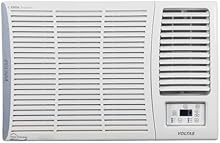Daikin 0.8 Ton 3 Star, Fixed Speed Split AC (Copper, PM 2.5 Filter, 2022 Model, FTL28U, White)
₹26390
₹37,400Daikin 1.5 Ton 5 Star Inverter Split AC (Copper, PM 2.5 Filter, MTKM50U, White)
₹45490
₹67,200Lloyd 1.5 Ton 3 Star Inverter Split AC (5 in 1 Convertible, Copper, Anti-Viral + PM 2.5 Filter, White with Chrome Deco Strip, GLS18I3FWAGC)
₹34490
₹58,990Hitachi 1.5 Ton Class 3 Star Xpandable+ Inverter Split AC (100% Copper, 4-Way Swing, ice Clean, Dust Filter, 3400SXL RAS.D318PCCIBS, White)
₹37490
₹63,850Voltas 1.5 Ton 3 Star, Turbo Mode Window AC (Copper Condenser, Anti-Rust Coating, Anti-Freeze Thermostat, WAC 183 Vectra pearl Window Fixed sp, White)
₹32990
₹47,900.00Hitachi 2 Ton Class 5 Star Xpandable+ Inverter Split AC (100% Copper, 4-Way Swing, ice Clean, Dust Filter, 5500STXL RAS.V522PCBISH1, White)
₹54990
₹98,950Hitachi 1 Ton Class 3 Star Xpandable+ Inverter Split AC (100% Copper, 4-Way Swing, ice Clean, Dust Filter, 3400SXL RAS.D312PCBIBS, White)
₹32990
₹55,050Voltas 1 ton 5 Star, Inverter Split AC (Copper, 4-in-1 Adjustable Mode, Anti-dust Filter, 125V Vectra CAW, White)
₹32990
₹52,100.00Daikin 1.8 Ton 3 Star Inverter Split AC (Copper, Anti Bacterial Filter, ATKL60UV16, White)
₹49990
₹85,999More ACs
Understanding Air Conditioners
An air conditioner is an electric appliance that helps you control the temperature of your room in a manner that is optimal and comfortable. In a country like India, where the summer months can be sweltering, having an air conditioner is almost a necessity rather than a luxury. Air conditioners not only provide relief from the heat but also improve indoor air quality by filtering out dust and pollutants. This makes them essential for maintaining a healthy living environment, particularly in urban areas where air quality can be compromised.
Advanced Features of Modern Air Conditioners
A few advanced air conditioners can automatically adjust the temperature within the room as per the outside temperature, thus keeping you cool and comfortable. These models often come equipped with smart technology that allows users to control settings via smartphone apps or voice commands. Features such as inverter technology enable these units to operate more efficiently by adjusting the compressor speed, thereby saving energy and reducing electricity bills. This is particularly important in India, where electricity costs can significantly impact household budgets during peak summer.
How Air Conditioners Work
An air conditioner works almost on the same principle as a refrigerator. However, unlike a refrigerator that takes heat away from the items stored within it, an air conditioner absorbs the heat from an entire room. This is accomplished through a refrigeration cycle that involves the evaporation and condensation of refrigerant. The process begins when the refrigerant absorbs heat from the indoor air, evaporating into a gas. This gas is then compressed, increasing its temperature and pressure, before passing through the condenser coils where it releases heat to the outside environment. The cooled refrigerant then returns to the evaporator coils to repeat the cycle.
The Importance of Energy Efficiency
When selecting the best air conditioner in India, energy efficiency should be a key consideration. Air conditioners are rated using the Indian Seasonal Energy Efficiency Ratio (ISEER), which indicates how efficiently an air conditioner operates over an entire cooling season. Higher ISEER ratings mean better energy efficiency, which not only helps in reducing electricity bills but also contributes to a lower carbon footprint. Brands that offer models with high ISEER ratings are increasingly gaining popularity among environmentally-conscious consumers.
Conclusion: Choosing the Right Air Conditioner
In conclusion, selecting the best air conditioner in India involves considering various factors such as energy efficiency, advanced features, and the specific cooling needs of your space. Whether you opt for a window unit, split system, or a portable model, understanding how air conditioners work and their benefits can help you make an informed decision. As technology continues to evolve, consumers can expect even more innovative features that enhance comfort and efficiency, making air conditioning an essential part of modern living in India.



















